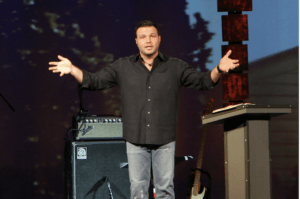There’s an interview in CT today with Chuck Colson reflecting on Evangelicals and Catholics Together. Two things are striking about the Colson’s comments.
Christianity Today
Calvin on "The Real Prosperity Gospel"
Christianity Today is running a series entitled, “Re-Formed” featuring essays by “John Calvin with Knox Bucer-Beza”—identified by CT as “the author of the Institutes of the Christian Religion and commentaries on most books of the Bible, both of which were sources of . . . Continue reading →
On The QIRE There's No Place to Stop
If the heart of the Christian faith and life is the unmediated encounter with God, even divinization (theosis), then how does one prevent a synthesis of evangelical pietism and New Age spirituality if the latter offers such access? According to this piece . . . Continue reading →
The Evangelical Abuse of Statistics
CT has published an interesting summary of research by Christian Smith. Some of the “facts” about American Christianity you think you know may not be facts at all.
"Tough Grace" Is Not Grace (and It’s Not Law Either)
In an unsigned editorial yesterday CT came out in favor of what it calls “tough grace.” The presenting issue or symptom is CT’s concern that Christian institutions are failing to be both “tough” and “gracious” simultaneously. The argument is that the fall . . . Continue reading →
Colson Calls for Doctrinal Boot Camp: But Which Doctrine?
In 1994 Chuck Colson attempted to convince evangelicals that the decline of the culture was so precipitous that they needed to set aside the historic Protestant doctrine of justification in favor of an intentionally equivocal statement about how we are accepted by . . . Continue reading →
Mark Galli Reviews Bell on Hell
Galli writes, “but in raising such momentous issues, he has raised crucial questions that also must be asked. If universal salvation is true, why does Jesus not showcase it? Why is Jesus’ teaching characterized instead by a relentless focus on the last . . . Continue reading →
Ross Douthat On The Virtues Of Confessionalism
For evangelicals, it means thinking more seriously about ecclesiology and what it will take to sustain Christianity across generations. Promise Keepers, Campus Crusade for Christ, and other parachurch groups have been important to evangelicalism. But “parachurch” makes sense over the long term . . . Continue reading →
Reconsidering Margaret Sanger In Christianity Today?
Where Is Carl Henry When We Need Him?
Margaret Sanger, 1879–1966 Continue reading →
Negotiating With Polyamory: A Snapshot Of Evangelicalism In 2020
H. Richard Niebuhr (1894–1962) is the slightly less famous younger brother of Reinhold Niebuhr (1892–1971). The latter was a favorite of two presidents, Jimmy Carter and Barack Obama. The former is most famous for his 1951 book, Christ and Culture, though his early work, The Social Sources of Denominationalism (1929) and The Kingdom of God in America (1937) remain influential. In the latter he perfectly characterized liberal Christianity as that in which “A God without wrath brought men without sin into a kingdom without judgment through the ministrations of a Christ without a cross.” In Christ and Culture he offered a taxonomy of Christian approaches Continue reading →
Piper’s Sea Shell Sermon Illustrates How Far The YRR Movement Was From The Reformation
So I am listening to the latest episode in the Christianity Today podcast series, “The Rise and Fall of Mars Hill.” Like the others it is illuminating, compelling, and frustrating simultaneously. Continue reading
Who Stopped Attending To The Due Use Of The Means Of Grace During Covid And Why
During his 21 years as lead pastor of Grace Church in Greenville, North Carolina, Mike Meshaw has seen many people come and go in the transient area that is home to East Carolina University. Before COVID-19 shut things down in March 2020, . . . Continue reading →
Parachurch or Pastoring (Part 2)
Previously began a discussion about parachurch ministries in relation to the church. The point was to raise a concern about how, frequently, parachurch ministries implicitly, if (perhaps) unintentionally, try to usurp the visible, institutional church’s primary role in God’s plan to save . . . Continue reading →
Christianity Today Is Not A Ministry
One of the episodes of Christianity Today‘s Mars Hill podcast series was actually about the problem of sexual harassment at Christianity Today (to their credit, after exposing the cultic nature of Mark Driscoll’s control over Mars Hill–in the sense that Jim Jones . . . Continue reading →
Para Means “Alongside” Not “Is”
Is the Family Research Council a church? What about Cru, the Gideons International, Voice of the Martyrs, Ravi Zacharias International Ministries (RZIM), Liberty Counsel, the American Family Association, Navigators, and World Vision? The Controversy According to a recent story by Daniel Silliman, . . . Continue reading →
The Narcissism of Evangelical Latitudinarianism
This essay was written before I published Recovering the Reformed Confession (2008), which, remarkably and quite unexpectedly, remains in print. In it, I interacted with a book review published in Christianity Today which serves as a symbol of the way Pietists and modern evangelicals . . . Continue reading →
Why Evangelicals Cannot Be Trusted With The Bible
Carolyn Arends wants to give an argument for the benefits of God’s moral law, but she lacks the categories by which to do it. Her argument has only two categories: good/bad, and relationships. The title and subtitle of her essay should alarm . . . Continue reading →






